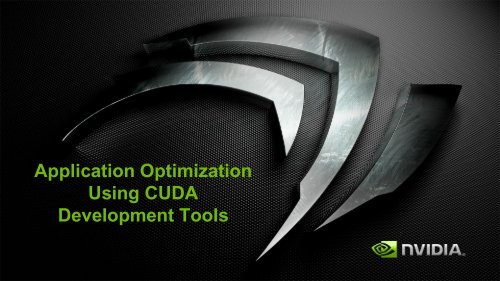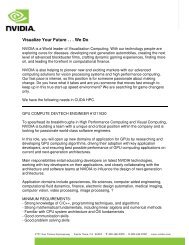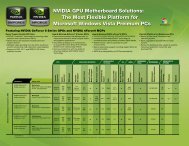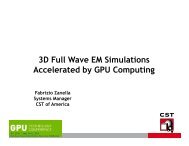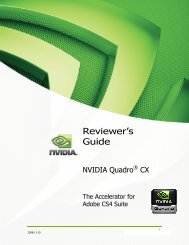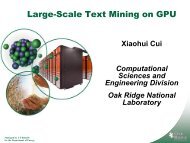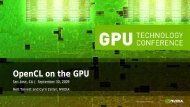Application Optimization Using CUDA Development Tools
Application Optimization Using CUDA Development Tools
Application Optimization Using CUDA Development Tools
Create successful ePaper yourself
Turn your PDF publications into a flip-book with our unique Google optimized e-Paper software.
<strong>Application</strong> <strong>Optimization</strong><br />
<strong>Using</strong> <strong>CUDA</strong><br />
<strong>Development</strong> <strong>Tools</strong>
<strong>Optimization</strong>: CPU and GPU<br />
32 GB/s<br />
A few cores<br />
CPU<br />
CPU Memory<br />
Good memory bandwidth<br />
Best at serial execution<br />
GPU<br />
GPU Memory<br />
177 GB/s<br />
Hundreds of cores<br />
Great memory bandwidth<br />
Best at parallel execution<br />
2
<strong>Optimization</strong>: Maximize Performance<br />
Take advantage of strengths of both CPU and GPU<br />
Entire application does not need to be ported to GPU<br />
Compute-Intensive<br />
Functions<br />
Directives<br />
<strong>CUDA</strong>-C/C++<br />
Fortran<br />
Libraries<br />
<strong>Application</strong> Code<br />
Rest of<br />
Sequential<br />
GPU CPU Code<br />
CPU<br />
3
<strong>Application</strong> <strong>Optimization</strong> Process and <strong>Tools</strong><br />
Identify <strong>Optimization</strong> Opportunities<br />
gprof<br />
Intel VTune<br />
Parallelize with <strong>CUDA</strong>, confirm functional correctness<br />
cuda-gdb, cuda-memcheck<br />
Parallel Nsight Memory Checker, Parallel Nsight Debugger<br />
3 rd party: Allinea DDT, TotalView<br />
Optimize<br />
NVIDIA Visual Profiler<br />
Parallel Nsight<br />
3 rd party: Vampir, Tau, PAPI, …<br />
4
1D Stencil: A Common Algorithmic Pattern<br />
Applying a 1D stencil to a 1D array of elements<br />
Function of input elements within a radius<br />
radius radius<br />
Fundamental to many algorithms<br />
Standard discretization methods, interpolation, convolution, filtering<br />
Our example will use weighted arithmetic mean<br />
5
in<br />
out<br />
Serial Algorithm<br />
(radius = 3)<br />
= Thread<br />
… …<br />
f<br />
… …<br />
6
in<br />
out<br />
Serial Algorithm<br />
(radius = 3)<br />
= Thread<br />
… …<br />
f<br />
… …<br />
…<br />
Repeat for each element<br />
7
Serial Implementation<br />
int main() {<br />
}<br />
int size = N * sizeof(float);<br />
int wsize = (2 * RADIUS + 1) * sizeof(float);<br />
//allocate resources<br />
float *weights = (float *)malloc(wsize);<br />
float *in = (float *)malloc(size);<br />
float *out= (float *)malloc(size);<br />
initializeWeights(weights, RADIUS);<br />
initializeArray(in, N);<br />
applyStencil1D(RADIUS,N-RADIUS,weights,in,out);<br />
//free resources<br />
free(weights); free(in); free(out);<br />
void applyStencil1D(int sIdx, int eIdx, const<br />
float *weights, float *in, float *out) {<br />
}<br />
for (int i = sIdx; I < eIdx; i++) {<br />
out[i] = 0;<br />
}<br />
//loop over all elements in the stencil<br />
for (int j = -RADIUS; j
Serial Implementation<br />
int main() {<br />
}<br />
int size = N * sizeof(float);<br />
int wsize = (2 * RADIUS + 1) * sizeof(float);<br />
//allocate resources<br />
float *weights = (float *)malloc(wsize);<br />
float *in = (float *)malloc(size);<br />
float *out= (float *)malloc(size);<br />
initializeWeights(weights, RADIUS);<br />
initializeArray(in, N);<br />
applyStencil1D(RADIUS,N-RADIUS,weights,in,out);<br />
//free resources<br />
free(weights); free(in); free(out);<br />
Apply<br />
stencil<br />
void applyStencil1D(int sIdx, int eIdx, const<br />
float *weights, float *in, float *out) {<br />
Allocate and<br />
initialize for (int i = sIdx; i < eIdx; i++) {<br />
out[i] = 0;<br />
}<br />
}<br />
Cleanup<br />
//loop over all elements in the stencil<br />
for (int j = -RADIUS; j
Serial Implementation<br />
int main() {<br />
}<br />
int size = N * sizeof(float);<br />
int wsize = (2 * RADIUS + 1) * sizeof(float);<br />
//allocate resources<br />
float *weights = (float *)malloc(wsize);<br />
float *in = (float *)malloc(size);<br />
float *out= (float *)malloc(size); Weighted<br />
initializeWeights(weights, RADIUS); mean over<br />
initializeArray(in, N);<br />
radius<br />
applyStencil1D(RADIUS,N-RADIUS,weights,in,out);<br />
//free resources<br />
free(weights); free(in); free(out);<br />
void applyStencil1D(int sIdx, int eIdx, For const each<br />
float *weights, float *in, float element… *out) {<br />
}<br />
for (int i = sIdx; I < eIdx; i++) {<br />
out[i] = 0;<br />
}<br />
//loop over all elements in the stencil<br />
for (int j = -RADIUS; j
Serial Implementation Performance<br />
int main() {<br />
}<br />
int size = N * sizeof(float);<br />
int wsize = (2 * RADIUS + 1) * sizeof(float);<br />
//allocate resources<br />
float *weights = (float *)malloc(wsize);<br />
float *in = (float *)malloc(size);<br />
float *out= (float *)malloc(size);<br />
initializeWeights(weights, RADIUS);<br />
initializeArray(in, N);<br />
applyStencil1D(RADIUS,N-RADIUS,weights,in,out);<br />
//free resources<br />
free(weights); free(in); free(out);<br />
void applyStencil1D(int sIdx, int eIdx, const<br />
float *weights, float *in, float *out) {<br />
CPU MElements/s<br />
i7-930 30<br />
}<br />
for (int i = sIdx; I < eIdx; i++) {<br />
out[i] = 0;<br />
}<br />
//loop over all elements in the stencil<br />
for (int j = -RADIUS; j
in<br />
out<br />
in<br />
out<br />
Parallel Algorithm<br />
Serial: 1 element at a time<br />
… …<br />
… …<br />
Parallel: many elements at a time<br />
= Thread<br />
… …<br />
… …<br />
… …<br />
12
int main() {<br />
int size = N * sizeof(float);<br />
int wsize = (2 * RADIUS + 1) * sizeof(float);<br />
//allocate resources<br />
float *weights = (float *)malloc(wsize);<br />
float *in = (float *)malloc(size);<br />
float *out= (float *)malloc(size);<br />
initializeWeights(weights, RADIUS);<br />
initializeArray(in, N);<br />
float *d_weights; cudaMalloc(&d_weights, wsize);<br />
float *d_in; cudaMalloc(&d_in, wsize);<br />
float *d_out; cudaMalloc(&d_out, wsize);<br />
}<br />
Parallel Implementation With <strong>CUDA</strong><br />
cudaMemcpy(d_weights,weights,wsize,cudaMemcpyHostToDevice);<br />
cudaMemcpy(d_in, in, wsize, cudaMemcpyHostToDevice);<br />
applyStencil1D<br />
(RADIUS, N-RADIUS, d_weights, d_in, d_out);<br />
cudaMemcpy(out, d_out, wsize, cudaMemcpyDeviceToHost);<br />
//free resources<br />
free(weights); free(in); free(out);<br />
cudaFree(d_weights); cudaFree(d_in); cudaFree(d_out);<br />
__global__ void applyStencil1D(int sIdx, int eIdx,<br />
const float *weights, float *in, float *out) {<br />
}<br />
int i = sIdx + blockIdx.x*blockDim.x + threadIdx.x;<br />
if (i < eIdx) {<br />
out[i] = 0;<br />
//loop over all elements in the stencil<br />
for (int j = -RADIUS; j
int main() {<br />
int size = N * sizeof(float);<br />
int wsize = (2 * RADIUS + 1) * sizeof(float);<br />
//allocate resources<br />
float *weights = (float *)malloc(wsize);<br />
float *in = (float *)malloc(size);<br />
float *out= (float *)malloc(size);<br />
initializeWeights(weights, RADIUS);<br />
initializeArray(in, N);<br />
float *d_weights; cudaMalloc(&d_weights, wsize);<br />
float *d_in; cudaMalloc(&d_in, wsize);<br />
float *d_out; cudaMalloc(&d_out, wsize);<br />
}<br />
Parallel Implementation With <strong>CUDA</strong><br />
cudaMemcpy(d_weights,weights,wsize,cudaMemcpyHostToDevice);<br />
cudaMemcpy(d_in, in, wsize, cudaMemcpyHostToDevice);<br />
applyStencil1D<br />
(RADIUS, N-RADIUS, d_weights, d_in, d_out);<br />
cudaMemcpy(out, d_out, wsize, cudaMemcpyDeviceToHost);<br />
//free resources<br />
free(weights); free(in); free(out);<br />
cudaFree(d_weights); cudaFree(d_in); cudaFree(d_out);<br />
__global__ void applyStencil1D(int sIdx, int eIdx,<br />
const float *weights, float *in, float *out) {<br />
Allocate GPU<br />
memory<br />
}<br />
int i = sIdx + blockIdx.x*blockDim.x + threadIdx.x;<br />
if (i < eIdx) {<br />
out[i] = 0;<br />
//loop over all elements in the stencil<br />
for (int j = -RADIUS; j
Parallel Implementation With <strong>CUDA</strong><br />
int main() {<br />
int size = N * sizeof(float);<br />
int wsize = (2 * RADIUS + 1) * sizeof(float);<br />
//allocate resources<br />
float *weights = (float *)malloc(wsize);<br />
float *in = (float *)malloc(size);<br />
float *out= (float *)malloc(size);<br />
initializeWeights(weights, RADIUS);<br />
initializeArray(in, N);<br />
float *d_weights; cudaMalloc(&d_weights, wsize);<br />
float *d_in; cudaMalloc(&d_in, wsize);<br />
float *d_out; cudaMalloc(&d_out, wsize);<br />
}<br />
cudaMemcpy(d_weights,weights,wsize,cudaMemcpyHostToDevice);<br />
cudaMemcpy(d_in, in, wsize, cudaMemcpyHostToDevice);<br />
applyStencil1D<br />
(RADIUS, N-RADIUS, d_weights, d_in, d_out);<br />
cudaMemcpy(out, d_out, wsize, cudaMemcpyDeviceToHost);<br />
//free resources<br />
free(weights); free(in); free(out);<br />
cudaFree(d_weights); cudaFree(d_in); cudaFree(d_out);<br />
__global__ void applyStencil1D(int sIdx, int eIdx,<br />
const float *weights, float *in, float *out) {<br />
}<br />
int i = sIdx + blockIdx.x*blockDim.x + threadIdx.x;<br />
if (i < eIdx) {<br />
out[i] = 0;<br />
//loop over all elements in the stencil<br />
for (int j = -RADIUS; j
int main() {<br />
int size = N * sizeof(float);<br />
}<br />
Parallel Implementation With <strong>CUDA</strong><br />
Indicates<br />
GPU kernel<br />
int wsize = (2 * RADIUS + 1) * sizeof(float);<br />
//allocate resources<br />
float *weights = (float *)malloc(wsize);<br />
float *in = (float *)malloc(size);<br />
float *out= (float *)malloc(size);<br />
initializeWeights(weights, RADIUS);<br />
initializeArray(in, N);<br />
float *d_weights; cudaMalloc(&d_weights, wsize);<br />
float *d_in; cudaMalloc(&d_in, wsize);<br />
float *d_out; cudaMalloc(&d_out, wsize);<br />
Launch a<br />
thread for<br />
each element<br />
cudaMemcpy(d_weights,weights,wsize,cudaMemcpyHostToDevice);<br />
cudaMemcpy(d_in, in, wsize, cudaMemcpyHostToDevice);<br />
applyStencil1D<br />
(RADIUS, N-RADIUS, d_weights, d_in, d_out);<br />
cudaMemcpy(out, d_out, wsize, cudaMemcpyDeviceToHost);<br />
//free resources<br />
free(weights); free(in); free(out);<br />
cudaFree(d_weights); cudaFree(d_in); cudaFree(d_out);<br />
__global__ void applyStencil1D(int sIdx, int eIdx,<br />
const float *weights, float *in, float *out) {<br />
}<br />
int i = sIdx + blockIdx.x*blockDim.x + threadIdx.x;<br />
if (i < eIdx) {<br />
out[i] = 0;<br />
//loop over all elements in the stencil<br />
for (int j = -RADIUS; j
int main() {<br />
int size = N * sizeof(float);<br />
int wsize = (2 * RADIUS + 1) * sizeof(float);<br />
//allocate resources<br />
float *weights = (float *)malloc(wsize); Get the array<br />
float *in = (float *)malloc(size); index for each<br />
}<br />
Parallel Implementation With <strong>CUDA</strong><br />
float *out= (float *)malloc(size);<br />
thread.<br />
initializeWeights(weights, RADIUS);<br />
initializeArray(in, N);<br />
float *d_weights; cudaMalloc(&d_weights, wsize);<br />
float *d_in; cudaMalloc(&d_in, wsize);<br />
float *d_out; cudaMalloc(&d_out, wsize);<br />
cudaMemcpy(d_weights,weights,wsize,cudaMemcpyHostToDevice);<br />
cudaMemcpy(d_in, in, wsize, cudaMemcpyHostToDevice);<br />
applyStencil1D<br />
(RADIUS, N-RADIUS, d_weights, d_in, d_out);<br />
cudaMemcpy(out, d_out, wsize, cudaMemcpyDeviceToHost);<br />
//free resources<br />
free(weights); free(in); free(out);<br />
cudaFree(d_weights); cudaFree(d_in); cudaFree(d_out);<br />
__global__ void applyStencil1D(int sIdx, int eIdx,<br />
const float *weights, float *in, float *out) {<br />
}<br />
int i = sIdx + blockIdx.x*blockDim.x + threadIdx.x;<br />
if (i < eIdx) {<br />
out[i] = 0;<br />
//loop over all elements in the stencil<br />
for (int j = -RADIUS; j
Functional Correctness<br />
But our first run returns an error!<br />
$ stencil1d<br />
Segmentation fault<br />
Debugging <strong>Tools</strong>:<br />
cuda-memcheck (memory checker)<br />
cuda-gdb (debugger)<br />
printf<br />
18
Memory Checker: cuda-memcheck<br />
$ cuda-memcheck stencil1d<br />
========= <strong>CUDA</strong>-MEMCHECK<br />
========= Invalid __global__ read of size 4<br />
========= at 0x00000240 in stencil1d.cu:60:applyStencil1D<br />
========= by thread (31,0,0) in block (0,0,0)<br />
========= Address 0x20020047c is out of bounds<br />
=========<br />
========= ERROR SUMMARY: 1 error<br />
Bad Address<br />
Bad<br />
Instruction<br />
Bad Thread Error Type<br />
Error<br />
Location<br />
19
Debugger: cuda-gdb<br />
$ cuda-gdb stencil1d<br />
(cuda-gdb) set cuda memcheck on<br />
(cuda-gdb) run<br />
[Launch of <strong>CUDA</strong> Kernel 0<br />
(applyStencil1D)<br />
on Device 0]<br />
Program received signal <strong>CUDA</strong>_EXCEPTION_1, Lane<br />
Illegal Address.<br />
applyStencil1D<br />
at stencil1d.cu:60<br />
(cuda-gdb) cuda thread<br />
thread (31,0,0)<br />
__global__ void applyStencil1D(int sIdx, int eIdx,<br />
const float *weights, float *in, float *out) {<br />
}<br />
int i = sIdx + blockIdx.x * blockDim.x + threadIdx.x;<br />
if (i < eIdx) {<br />
out[ i ] = 0;<br />
//loop over all elements in the stencil<br />
for (int j = -RADIUS; j
Debugger: cuda-gdb<br />
(cuda-gdb) print &weights[j+RADIUS]<br />
(const float *) 0x20020003c<br />
(cuda-gdb) print &in[i+j]<br />
(float *) 0x20020047c<br />
(cuda-gdb) print i+j<br />
31<br />
__global__ void applyStencil1D(int sIdx, int eIdx,<br />
const float *weights, float *in, float *out) {<br />
}<br />
int i = sIdx + blockIdx.x * blockDim.x + threadIdx.x;<br />
if (i < eIdx) {<br />
out[ i ] = 0;<br />
//loop over all elements in the stencil<br />
for (int j = -RADIUS; j
Debugger: cuda-gdb<br />
(cuda-gdb) thread 1<br />
(cuda-gdb) info stack<br />
[...]<br />
#10 0x0000000000400e86 in main<br />
(cuda-gdb) frame 10<br />
#10 0x0000000000400e86 in main<br />
(cuda-gdb) print wsize / 4<br />
31<br />
(cuda-gdb) print size / 4<br />
16777216<br />
Switch to the<br />
CPU thread<br />
Switch to the frame<br />
where the<br />
allocation occurred<br />
float *d_weights; cudaMalloc(&d_weights , wsize);<br />
float *d_in; cudaMalloc(&d_in , wsize);<br />
float *d_out; cudaMalloc(&d_out , wsize);<br />
cudaMemcpy(d_weights, weights, wsize, ...);<br />
cudaMemcpy(d_in, in, wsize, ...);<br />
applyStencil1D<br />
(RADIUS, N-RADIUS, d_weights, d_in, d_out);<br />
cudaMemcpy(out, d_out, wsize, ...);<br />
Found bad<br />
allocation size<br />
22
Corrected Parallel Implementation<br />
int main() {<br />
int size = N * sizeof(float);<br />
int wsize = (2 * RADIUS + 1) * sizeof(float);<br />
//allocate resources<br />
float *weights = (float *)malloc(wsize);<br />
float *in = (float *)malloc(size);<br />
float *out= (float *)malloc(size);<br />
initializeWeights(weights, RADIUS);<br />
initializeArray(in, N);<br />
float *d_weights; cudaMalloc(&d_weights, wsize);<br />
float *d_in; cudaMalloc(&d_in, size);<br />
float *d_out; cudaMalloc(&d_out, size);<br />
}<br />
cudaMemcpy(d_weights,weights,wsize,cudaMemcpyHostToDevice);<br />
cudaMemcpy(d_in, in, size, cudaMemcpyHostToDevice);<br />
applyStencil1D<br />
(RADIUS, N-RADIUS, d_weights, d_in, d_out);<br />
cudaMemcpy(out, d_out, size, cudaMemcpyDeviceToHost);<br />
//free resources<br />
free(weights); free(in); free(out);<br />
cudaFree(d_weights); cudaFree(d_in); cudaFree(d_out);<br />
__global__ void applyStencil1D(int sIdx, int eIdx,<br />
const float *weights, float *in, float *out) {<br />
}<br />
int i = sIdx + blockIdx.x*blockDim.x + threadIdx.x;<br />
if (i < eIdx) {<br />
out[i] = 0;<br />
//loop over all elements in the stencil<br />
for (int j = -RADIUS; j
Parallel Nsight for Visual Studio<br />
Debugger<br />
stops at the<br />
failure<br />
location<br />
Detailed<br />
information<br />
High level<br />
message of<br />
the access<br />
violation<br />
24
Parallel Nsight for Visual Studio<br />
OutOfRangeLoad<br />
GPU Exception<br />
25
int main() {<br />
int size = N * sizeof(float);<br />
int wsize = (2 * RADIUS + 1) * sizeof(float);<br />
//allocate resources<br />
float *weights = (float *)malloc(wsize);<br />
float *in = (float *)malloc(size);<br />
float *out= (float *)malloc(size);<br />
initializeWeights(weights, RADIUS);<br />
initializeArray(in, N);<br />
float *d_weights; cudaMalloc(&d_weights, wsize);<br />
float *d_in; cudaMalloc(&d_in, size);<br />
float *d_out; cudaMalloc(&d_out, size);<br />
}<br />
Parallel Implementation Performance<br />
cudaMemcpy(d_weights,weights,wsize,cudaMemcpyHostToDevice);<br />
cudaMemcpy(d_in, in, size, cudaMemcpyHostToDevice);<br />
applyStencil1D<br />
(RADIUS, N-RADIUS, d_weights, d_in, d_out);<br />
cudaMemcpy(out, d_out, size, cudaMemcpyDeviceToHost);<br />
//free resources<br />
free(weights); free(in); free(out);<br />
cudaFree(d_weights); cudaFree(d_in); cudaFree(d_out);<br />
__global__ void applyStencil1D(int sIdx, int eIdx,<br />
const float *weights, float *in, float *out) {<br />
int i = sIdx + blockIdx.x*blockDim.x + threadIdx.x;<br />
if (i < eIdx) {<br />
out[i] = 0;<br />
//loop over all elements in the stencil<br />
for (int j = -RADIUS; j
Printf<br />
Commonly used for debugging, available on GPU<br />
__global__ void applyStencil1D(int sIdx, int eIdx,<br />
const float *weights, float *in, float *out) {<br />
}<br />
int i = sIdx + blockIdx.x * blockDim.x + threadIdx.x;<br />
if (i < eIdx) {<br />
out[ i ] = 0;<br />
//loop over all elements in the stencil<br />
for (int j = -RADIUS; j
2x Performance In 2 Hours<br />
In just a couple of hours we…<br />
Used <strong>CUDA</strong> to parallelize our application<br />
Used cuda-memcheck and cuda-gdb to detect and correct some bugs<br />
Got 2.2x speedup over parallelized and optimized CPU code<br />
We used <strong>CUDA</strong>-C/C++, but other options available…<br />
Libraries (NVIDIA and 3 rd party)<br />
Directives<br />
Other <strong>CUDA</strong> languages (Fortran, Java, …)<br />
28
<strong>Application</strong> <strong>Optimization</strong> Process (Revisited)<br />
Identify <strong>Optimization</strong> Opportunities<br />
1D stencil algorithm<br />
Parallelize with <strong>CUDA</strong>, confirm functional correctness<br />
cuda-gdb, cuda-memcheck<br />
Optimize<br />
?<br />
29
Optimize<br />
Can we get more performance?<br />
Visual Profiler<br />
Visualize CPU and GPU activity<br />
Identify optimization opportunities<br />
Automated analysis<br />
30
NVIDIA Visual Profiler<br />
31
NVIDIA Visual Profiler<br />
Timeline of<br />
CPU and GPU<br />
activity<br />
Kernel and<br />
memcpy<br />
details<br />
32
NVIDIA Visual Profiler<br />
<strong>CUDA</strong> API<br />
activity on<br />
CPU<br />
Memcpy and<br />
kernel activity<br />
on GPU<br />
33
Detecting Low Memory Throughput<br />
Spend majority of time in data transfer<br />
Often can be overlapped with preceding or following computation<br />
From timeline can see that throughput is low<br />
PCIe x16 can sustain > 5GB/s<br />
34
Visual Profiler Analysis<br />
How do we know when there is an optimization opportunity?<br />
Timeline visualization seems to indicate an opportunity<br />
Documentation gives guidance and strategies for tuning<br />
<strong>CUDA</strong> Best Practices Guide<br />
<strong>CUDA</strong> Programming Guide<br />
Visual Profiler analyzes your application<br />
Uses timeline and other collected information<br />
Highlights specific guidance from Best Practices<br />
Like having a customized Best Practices Guide for your application<br />
35
Visual Profiler Analysis<br />
Several types<br />
of analysis<br />
are provided<br />
Analysis<br />
pointing out<br />
low memcpy<br />
throughput<br />
36
Online <strong>Optimization</strong> Help<br />
Each analysis<br />
has link to Best<br />
Practices<br />
documentation<br />
37
Pinned CPU Memory Implementation<br />
int main() {<br />
int size = N * sizeof(float);<br />
int wsize = (2 * RADIUS + 1) * sizeof(float);<br />
//allocate resources<br />
float *weights; cudaMallocHost(&weights, wsize);<br />
float *in; cudaMallocHost(&in, size);<br />
float *out; cudaMallocHost(&out, size);<br />
initializeWeights(weights, RADIUS);<br />
initializeArray(in, N);<br />
float *d_weights; cudaMalloc(&d_weights);<br />
float *d_in; cudaMalloc(&d_in);<br />
float *d_out; cudaMalloc(&d_out);<br />
…<br />
CPU allocations<br />
use pinned<br />
memory to enable<br />
fast memcpy<br />
No other changes<br />
38
Pinned CPU Memory Result<br />
39
Pinned CPU Memory Result<br />
Device Algorithm MElements/s Speedup<br />
i7-930* Optimized & Parallel 130 1x<br />
Tesla C2075 Simple 285 2.2x<br />
Tesla C2075 Pinned Memory 560 4.3x<br />
*4 cores + hyperthreading<br />
40
<strong>Application</strong> <strong>Optimization</strong> Process (Revisited)<br />
Identify <strong>Optimization</strong> Opportunities<br />
1D stencil algorithm<br />
Parallelize with <strong>CUDA</strong>, confirm functional correctness<br />
Debugger<br />
Memory Checker<br />
Optimize<br />
Profiler (pinned memory)<br />
41
<strong>Application</strong> <strong>Optimization</strong> Process (Revisited)<br />
Identify <strong>Optimization</strong> Opportunities<br />
1D stencil algorithm<br />
Parallelize with <strong>CUDA</strong>, confirm functional correctness<br />
Debugger<br />
Memory Checker<br />
Optimize<br />
Profiler (pinned memory)<br />
42
Advanced optimization<br />
Larger time investment<br />
Potential for larger speedup<br />
43
in<br />
out<br />
Data Partitioning Example<br />
Partition<br />
data into 2<br />
chunks<br />
chunk 1 chunk 2<br />
44
in<br />
out<br />
Data Partitioning Example<br />
chunk 1 chunk 2<br />
memcpy compute memcpy<br />
45
in<br />
out<br />
Data Partitioning Example<br />
chunk 1 chunk 2<br />
memcpy compute memcpy<br />
memcpy compute memcpy<br />
46
Overlapped Compute/Memcpy<br />
47
Overlapped Compute/Memcpy<br />
Compute time<br />
completely<br />
“hidden”<br />
Exploit dual<br />
memcpy<br />
engines<br />
48
Overlapped Compute/Memcpy Result<br />
Device Algorithm MElements/s Speedup<br />
i7-930* Optimized & Parallel 130 1x<br />
Tesla C2075 Simple 285 2.2x<br />
Tesla C2075 Pinned Memory 560 4.3x<br />
Tesla C2075 Overlap 935 7.2x<br />
*4 cores + hyperthreading<br />
49
Parallel Nsight For Visual Studio<br />
Correlation<br />
Hierarchy<br />
Timeline<br />
CPU & GPU<br />
Correlation<br />
Details<br />
50
Parallel Nsight For Visual Studio<br />
Instruction, Branch, Memory and<br />
Other Analysis<br />
51
<strong>Application</strong> <strong>Optimization</strong> Process (Revisited)<br />
Identify <strong>Optimization</strong> Opportunities<br />
1D stencil algorithm<br />
Parallelize with <strong>CUDA</strong>, confirm functional correctness<br />
Debugger<br />
Memory Checker<br />
Optimize<br />
Profiler (pinned memory)<br />
Profiler (overlap memcpy and compute)<br />
52
Iterative <strong>Optimization</strong><br />
Identify <strong>Optimization</strong> Opportunities<br />
Parallelize with <strong>CUDA</strong><br />
Optimize<br />
53
<strong>Optimization</strong> Summary<br />
Initial <strong>CUDA</strong> parallelization and functional correctness<br />
1-2 hours<br />
2.2x speedup<br />
Optimize memory throughput<br />
1-2 hours<br />
4.3x speedup<br />
Overlap compute and data movement<br />
1-2 days<br />
7.2x speedup<br />
54
Summary<br />
<strong>CUDA</strong> accelerates compute-intensive parts of your application<br />
<strong>Tools</strong> are available to help with:<br />
Identifying optimization opportunities<br />
Functional correctness<br />
Performance optimization<br />
Get Started<br />
Download free <strong>CUDA</strong> Toolkit: www.nvidia.com/getcuda<br />
Join the community: developer.nvidia.com/join<br />
Check out the booth demo stations, experts table<br />
See Parallel Nsight at the Microsoft booth (#1601 – 4 th floor bridge)<br />
Get stencil example: developer.nvidia.com/sc11<br />
55
Questions?


